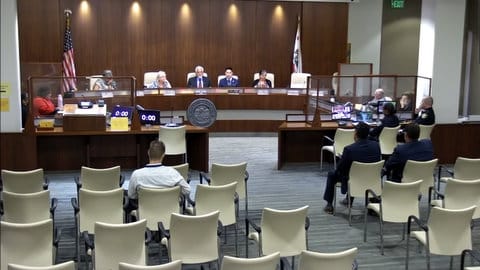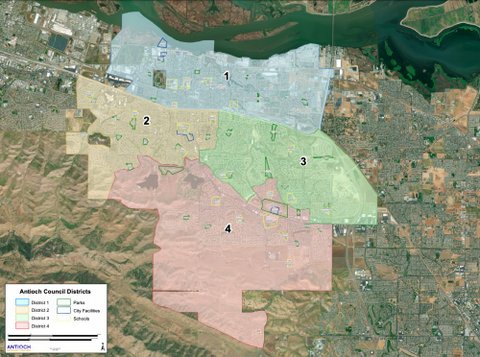
08 Nov Richmond Approves New Cameras for Law Enforcement

Richmond City Council on Tuesday approved 70 new automatic license plate readers and 40 pan-tilt-zoom cameras to prevent and solve crime. (Screenshot captured by Samantha Kennedy / The CC Pulse)
By Samantha Kennedy
The Richmond City Council unanimously approved the installation of over 100 additional cameras across the city to help deter and solve crime. But the decision wasn’t without concern.
The Tuesday meeting ended with council members approving a total of 70 automatic license plate readers and 40 pan-tilt-zoom cameras. Additional language was passed that will require educating the public on the cameras by the Police Department. Council members Claudia Jimenez and Melvin Willis were absent.
Vice Mayor Gayle McLaughlin’s substitute motion to approve only the pan-tilt-zoom cameras and analyze the effectiveness of increased cameras failed.
McLaughlin, who ultimately voted in favor of the cameras, said she wasn’t against the cameras but felt that it raised privacy issues within the community that other cities have brought up. Other cities, she said, like Berkeley and Fremont will have fewer cameras than Richmond but have population sizes that are much bigger or equal to the city.
The amount of cameras is not based on population size but on geographical area, according to Richmond’s Chief of Police Bisa French, of which Richmond’s area is greater than a city like Berkeley. French and other department staff agreed with comments made by council member Cesar Zepeda, who said that residents have no reasonable expectation of privacy in public.
McLaughlin said she would have liked to see an analysis considering residents’ civil liberties and cost taken into account before approving additional cameras.
“Maybe it would showcase a need for less,” she said. McLaughlin had no concerns with the pan-tilt-zoom cameras, which are replacing older CCTV cameras in the city, and said she believed they do what the community has been asking for.
French said the cameras already installed have contributed to the solving of crimes in the low-staffed department. The license plate readers have been used to solve murders, shootings, robberies and other crimes in the city.
Other Bay Area cities have implemented LPRs, with differing results. Piedmont Police Department, which has arrested approximately 27 people a year due to the cameras, considers the cameras a success. The city has 39 cameras affixed to police cars or on city infrastructure. Cities like Oakland have not been as lucky as Piedmont, according to data obtained by KTVU in September. The city’s 36 LPRs did not give the Police Department any leads for the entirety of 2022.
But French said the department could do more with the additional cameras. Recent shootings on 23rd Street, including one where two people were killed last month, might have been solved if more cameras were covering the area, according to French. The approval of the additional cameras will bring 10 more cameras to cover the 23rd Street corridor.
In addition to helping the police department, the cameras may also help prove the innocence of persons of interest in a crime. French said Richmond’s department has already seen the benefit of this when a person of interest was cleared after LPRs showed them driving in a different direction than the crime.
McLaughlin said to really be effective at addressing crime, the council should target the root causes.
“You can’t just arrest your way out of crime,” she said.
Of the six people who spoke during public comment, five residents expressed approval for an increase in cameras around the city, which mirrors encounters council members say they have had with the community. Those same residents said they were “baffled” at McLaughlin’s comments. The one commenter who opposed the cameras was from the organization Oakland Privacy.
Ben Therriault, president of the Richmond Police Officers Association, criticized the council’s approach to public safety. He specifically expressed frustration regarding McLaughlin’s comments asking if the city or department had a policy for the cameras. Department staff said the policy was included in the documents attached to the agenda.
“You pull an item that you don’t even read, that we have a policy,” Therriault said. “Can we get some common sense on public safety on this council?”
“Safety is safety,” resident Naomi Williams told the council. “You might not need them in your district . . . we need them down here where I live. It’s not a plaything.”






Anonymous Sally
Posted at 21:51h, 08 NovemberWhile this statement is technically true: “A majority of residents during public comment expressed approval for an increase in cameras around the city,.. I think it can be misleading. I’d like to point out there were only 6 speakers. 1 against the cameras and 5 for them. Glad it passed but that sentence struck me as making it seem much bigger than it was.
Danielle Parenteau-Decker
Posted at 13:14h, 10 NovemberThank you for pointing this out. I agree that that line as originally written could have been clearer. I took this to the reporter, and we have updated the story.
T
Posted at 10:41h, 29 NovemberWho has access to tall these camera’s? The data? Is it staying within Richmond, or will it be on some server in another country.